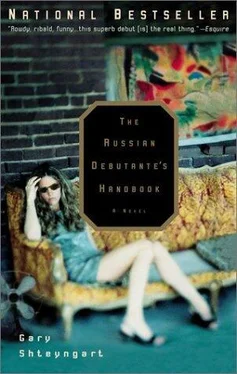Gary Shteyngart - The Russian Debutante's Handbook
Здесь есть возможность читать онлайн «Gary Shteyngart - The Russian Debutante's Handbook» весь текст электронной книги совершенно бесплатно (целиком полную версию без сокращений). В некоторых случаях можно слушать аудио, скачать через торрент в формате fb2 и присутствует краткое содержание. Город: New York, Год выпуска: 2003, ISBN: 2003, Издательство: Riverhead Books, Жанр: Современная проза, Юмористическая проза, на английском языке. Описание произведения, (предисловие) а так же отзывы посетителей доступны на портале библиотеки ЛибКат.
- Название:The Russian Debutante's Handbook
- Автор:
- Издательство:Riverhead Books
- Жанр:
- Год:2003
- Город:New York
- ISBN:0-7865-4177-6
- Рейтинг книги:4 / 5. Голосов: 1
-
Избранное:Добавить в избранное
- Отзывы:
-
Ваша оценка:
- 80
- 1
- 2
- 3
- 4
- 5
The Russian Debutante's Handbook: краткое содержание, описание и аннотация
Предлагаем к чтению аннотацию, описание, краткое содержание или предисловие (зависит от того, что написал сам автор книги «The Russian Debutante's Handbook»). Если вы не нашли необходимую информацию о книге — напишите в комментариях, мы постараемся отыскать её.
and
. The Russian Debutante’s Handbook Bursting with wit, humor, and rare insight,
is both a highly imaginative romp and a serious exploration of what it means to be an immigrant in America.
The Russian Debutante's Handbook — читать онлайн бесплатно полную книгу (весь текст) целиком
Ниже представлен текст книги, разбитый по страницам. Система сохранения места последней прочитанной страницы, позволяет с удобством читать онлайн бесплатно книгу «The Russian Debutante's Handbook», без необходимости каждый раз заново искать на чём Вы остановились. Поставьте закладку, и сможете в любой момент перейти на страницу, на которой закончили чтение.
Интервал:
Закладка:
On their own they didn’t get past some perfunctory grunts, and “Boy, this beer is good,” but then the conscripts next to them, a Jan and a Voichek, started passing around German pornography and practicing their English. Quickly the nude women got to Cohen and Plank; they sighed in unison each time a page was turned by the leering Jan or his giggling, younger companion. “She looks just like Alexandra,” they said, and then tried to explain to the conscripts in a combination of English, Stolovan, and Masculinity, that they knew a woman just as gorgeous and desirable as the one on display. Jan and Voichek were greatly impressed.
“Like this?” they said, pointing at breasts and labias and then looking back awed at the Americans who, at least in the female company they kept, still seemed the citizens of a great world power.
What amazed Vladimir, who contributed little to the conversation beyond some simulated slobber, was that the German Valkyries in the magazine did not resemble Alexandra in the slightest. The models were blond and impossibly tall, with legs spread out like pincers to expose the uniformly hairless run of pink held open by several fingers. Alexandra, while not short or heavy, was hardly towering, or blond, or paper-thin. Her Portuguese fore-mothers had bequeathed her a healthy Mediterranean fullness of hips, lips, and breasts. The only criteria satisfied by both her and the women in the magazine was that they were all desirable.
For Plank and Cohen that was enough. Anything would have been enough to get them hot and upset. Soon the particulars of Plank’s and Cohen’s malaise dawned on the conscripts and they excused themselves claiming they had to go pick up their girlfriends “for the prophylactic work.”
“Okay, gents,” Vladimir said, when standard English had returned to their corner of the bar. “Another round, what do you say?”
Grunts of approval as enthusiastic as the lowing of cows.
“All right,” Vladimir said. “Look, I have a thing for Alexandra too.”
Happy amazement. Him too! A universal dilemma! “But what about Morgan?” Plank asked, scratching at his enormous shaved head.
Vladimir shrugged. What about Morgan? Could he unbosom himself to the boys? No, it was out of the question. They were too fragile and set in their ways. The news of Morgan’s double life could easily give each a stroke.
“It is possible to love two women,” Vladimir declared in answer to Plank’s question. “Especially when you only sleep with one of them.”
“Yes, I believe that’s right,” said the scholarly Cohen, as if these laws were codified and available for perusal at the Rimbaud Institute of Desire. “Although sooner or later things start to fall apart.”
Vladimir ignored that, pressing on like a concerned den mother: “What you boys need is to chase after someone else. And I mean really chase and not just wait and mope.” There was laughter. “I’m serious. Look at the position you find yourself in: You’re on top of the world here. You’re more respected than you’ll ever be…”
He hadn’t meant it quite so truthfully. “You’re more respected in the context of being young and not yet aware of the full range of your artistic proclivities,” he clarified, although it was not necessary. They knew they were great. “You can have just about anyone you want in this town!” he shouted.
“Just about,” Cohen said, sadly chewing on his beer.
“I hear you, brother,” Plank mumbled to Cohen.
The boys tried to smile and shrug good-naturedly, as senior citizens from the Old World are bound to do when informed that their daily meal of fondue and blood sausages can have repercussions.
Vladimir, for one, was prepared to spend the whole evening hammering in his message and draining the prodigious taps. Unbeknownst to him, however, there were rumors, broadcast to the whole neighborhood by patrons staggering home, of a group of strangely dressed American dandies loitering in the local watering hole, and these rumors soon yielded a visitor.
HE WAS Arather striking Stolovan—tall and built, it would seem, from the same millennial bricks that had gone into the Emanuel Bridge. The hair was cropped short and adorned with a cowlick, as was the emerging fashion in Western capitals; and the clothes, a gray turtleneck and a vest of black corduroy, were also close to the latest style. Not to mention that he was in his early forties and men of that age group could be given some leeway as far as their wardrobes were concerned; that is to say, points could be given for effort alone.
“Hello, dear guests,” he said in an accent so slight it approximated Vladimir’s. “Your glasses are almost empty. Permit me!” He shouted orders to the barmaid. The glasses were filled.
“My name is František,” he said, “and I am a longtime citizen of this city and this neighborhood. Now allow me to guess where you’re from. I have a natural gift for geography. Detroit?”
He was not completely wrong. Plank, as has been established before, was indeed from a suburb of the Motor City. “But what about me says Detroit?” the dog-breeder wanted to know with outright indignation.
“I notice your height, lankiness, and complexion,” František said, unhurriedly sipping his beer. “I deduce from these attributes that your ancestry is of this part of the world. Not exactly Stolovan, but are you, by chance, Moravian?”
“Partly, I believe,” Plank said. “I like to think of myself as more of a Bohemian.”
This joke went unappreciated. František continued: “So I think of parts of the States with big concentrations of Eastern Europeans and immediately I think of big Midwestern cities, but, for some reason, not Chicago when I look at you. So… Detroit.”
“Very good,” Vladimir said, already trying to draw a map of their new acquaintance’s social complexion to better account for his remarkable sagacity. “But, in my case, as you can plainly see,” Vladimir said, “my ancestry is not of this part of the world, and hence, it is unlikely that I am from Detroit.”
“Yes, perhaps you are not from Detroit,” František said, keeping his good form. “But, unless I am a complete fool, which is surely possible, I do believe that your ancestry is from this part of the world, because you look to me a Jew!”
Cohen bristled at the use of the last word, but František continued: “And furthermore, your accent says to me that it was you and not your ancestors that left this part of the world or, to be more precise, Russia or the Ukraine, for sadly we don’t have any Jews left here except in the cemeteries where they’re stacked ten to a grave. So, then, New York is where you resettled, and your father’s either a doctor or an engineer; and by the looks of your goatee and long hair you are an artist or, more likely, a writer; and your parents are aghast, because they do not consider it a profession; and university is so expensive in the States, but still it is doubtful they would have settled for anything but the most expensive college, since you are likely the only child; obviously so, since most cosmopolitan Muscovites or Petersburgers (is that where you’re from?) have one child, at most, two, in an effort to concentrate meager resources.”
“You are a professor,” said Vladimir, “or else a traveler and voracious reader of periodicals.” He was not surprised to find himself easily replicating the voice and tone of the Stolovan. He was that infectious.
“Well,” said František. “I am not a professor. No.”
“Fine then,” said Cohen, seemingly satisfied that the man was not an anti-Semite. “I’ll get the next beers if you entertain us with the story of your life.”
“You get the beers and I will buy shots of vodka,” recommended František. “They complement each other perfectly. You will see.”
Читать дальшеИнтервал:
Закладка:
Похожие книги на «The Russian Debutante's Handbook»
Представляем Вашему вниманию похожие книги на «The Russian Debutante's Handbook» списком для выбора. Мы отобрали схожую по названию и смыслу литературу в надежде предоставить читателям больше вариантов отыскать новые, интересные, ещё непрочитанные произведения.
Обсуждение, отзывы о книге «The Russian Debutante's Handbook» и просто собственные мнения читателей. Оставьте ваши комментарии, напишите, что Вы думаете о произведении, его смысле или главных героях. Укажите что конкретно понравилось, а что нет, и почему Вы так считаете.












